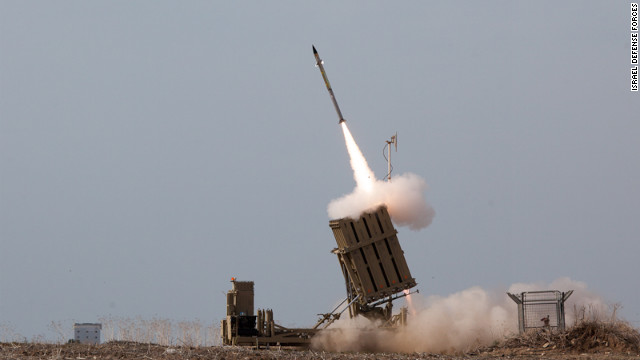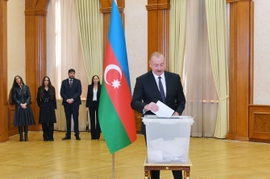Azerbaijan is preparing to purchase "Iron Dome," from Israel, the advanced anti-missile system, Azerbaijan will be the first country to acquire this sophisticated technology from Israel to improve its military and defensive capacities.
Developed by Rafael Advanced Defense Systems Ltd., Iron Dome is a battery of the interceptors that protects populated areas from short-range aerial rocket missiles attacks and artillery shells fired from enemy positions. The Iron Dome system is considered one of the world’s most effective missile shields with an intercept success rate of 90 percent.
Yevda Abramov, a Jewish Member of Parliament was quoted as saying that the defense shield is ready for shipment, but provided no further details. Undoubtedly, this will be one of the top priority issues on the agenda of Israeli Prime Minister Benjamin Netanyahu during his scheduled visit to Azerbaijan in December. Of note, bilateral relations between Azerbaijan and Israel have been rapidly developing since the collapse of former Soviet Union in early 1990s.
Both countries have been ardently developing economic relations and geopolitical cooperation. Trade turnover between the two countries amounts to USD5 billion. Azerbaijan supplies 40 percent of its oil, while Israel exports agricultural and medical technologies and invests clean-tech projects. Azerbaijan is one of the main recipients of Israeli arms, including drones, artillery weapons, anti-craft and missile defense systems.
Azerbaijan’s increasing economic power has afforded an increase in military spending geared to restoration of the nation’s territorial integrity. Azerbaijan’s military arsenal is equipped with weapons purchased from countries like Israel, Russia and Turkey as well as indigenous weapons systems. Recently, these military and technological advances allowed the Azerbaijan Armed Forces liberating a number of strategically located heights during a 4-day war with Armenia in April 2016.
Soon after regaining its independence from the Soviet Union, Azerbaijan was embroiled in a bloody war with neighboring Armenia in the course of 1991-1994. During this war, 20 percent of Azerbaijan’s internationally recognized territory, including Nagorno Karabakh, was occupied by Armenia. The war ended in a fragile ceasefire agreement signed between Azerbaijan and Armenia. Peace talks, brokered by the Minsk Group of the Organization for Security and Cooperation in Europe (OSCE) co-chaired by the United States, Russian Federation and France, have yielded no result in more than two decades. The unstable situation on the line contact over the last 20 years continues undermining further prospects over a peaceful settlement to the conflict and can anytime be morphed into a full scale war.




 Azerbaijan and Armenia started the process of demarcation of their border on Tuesday, with the installation of the first border markers based on ge...
Azerbaijan and Armenia started the process of demarcation of their border on Tuesday, with the installation of the first border markers based on ge...
 President Aliyev emphasized the critical role of the North-South Transport Corridor in fostering transport cooperation between Azerbaijan and Russi...
President Aliyev emphasized the critical role of the North-South Transport Corridor in fostering transport cooperation between Azerbaijan and Russi...
 Armenian sappers commenced on Monday mine-clearance operations in the territories adjacent to the Saint Mary Church in village of Voskepar (Armenia...
Armenian sappers commenced on Monday mine-clearance operations in the territories adjacent to the Saint Mary Church in village of Voskepar (Armenia...
 Russian Foreign Minister Sergei Lavrov has reasserted that Moscow has no intentions to stop the fighting in Ukraine, even if peace talks commence.
Russian Foreign Minister Sergei Lavrov has reasserted that Moscow has no intentions to stop the fighting in Ukraine, even if peace talks commence.
 Iran has refuted reports of alleged damage to Shimon Peres Negev Nuclear Research Centre located southeast of Dimona, Israel, during the recent air...
Iran has refuted reports of alleged damage to Shimon Peres Negev Nuclear Research Centre located southeast of Dimona, Israel, during the recent air...
 Iran’s Foreign Minister, Hossein Amir-Abdollahian, has labeled a foiled Israeli drone attack in certain parts of the country as a "failure" for Isr...
Iran’s Foreign Minister, Hossein Amir-Abdollahian, has labeled a foiled Israeli drone attack in certain parts of the country as a "failure" for Isr...
